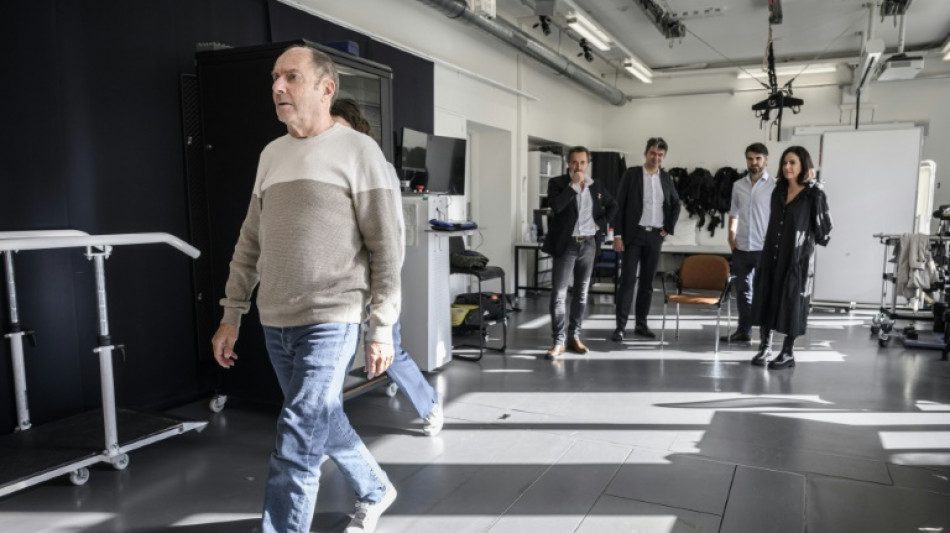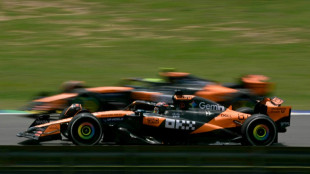
-
 Iran, US prepare for Oman talks after deadly protest crackdown
Iran, US prepare for Oman talks after deadly protest crackdown
-
Winter Olympics opening ceremony nears as virus disrupts ice hockey

-
 Mining giant Rio Tinto abandons Glencore merger bid
Mining giant Rio Tinto abandons Glencore merger bid
-
Davos forum opens probe into CEO Brende's Epstein links

-
 ECB warns of stronger euro impact, holds rates
ECB warns of stronger euro impact, holds rates
-
Famine spreading in Sudan's Darfur, warn UN-backed experts

-
 Lights back on in eastern Cuba after widespread blackout
Lights back on in eastern Cuba after widespread blackout
-
Russia, US agree to resume military contacts at Ukraine talks

-
 Greece aims to cut queues at ancient sites with new portal
Greece aims to cut queues at ancient sites with new portal
-
No time frame to get Palmer in 'perfect' shape - Rosenior

-
 Stocks fall as tech valuation fears stoke volatility
Stocks fall as tech valuation fears stoke volatility
-
US Olympic body backs LA28 leadership amid Wasserman scandal

-
 Gnabry extends Bayern Munich deal until 2028
Gnabry extends Bayern Munich deal until 2028
-
England captain Stokes suffers facial injury after being hit by ball

-
 Italy captain Lamaro amongst trio set for 50th caps against Scotland
Italy captain Lamaro amongst trio set for 50th caps against Scotland
-
Piastri plays down McLaren rivalry with champion Norris

-
 ECB holds interest rates as strong euro causes jitters
ECB holds interest rates as strong euro causes jitters
-
Spain, Portugal face floods and chaos after deadly new storm

-
 EU close to sealing trade deal with Australia
EU close to sealing trade deal with Australia
-
German Cup final to stay in Berlin until 2030

-
 What does Iran want from talks with the US?
What does Iran want from talks with the US?
-
Taming the lion: Olympians take on Bormio's terrifying Stelvio piste

-
 Wind turbine maker Vestas sees record revenue in 2025
Wind turbine maker Vestas sees record revenue in 2025
-
Italy's Casse tops second Olympic downhill training

-
 Anti-doping boss 'uncomfortable' with Valieva's coach at Olympics
Anti-doping boss 'uncomfortable' with Valieva's coach at Olympics
-
Bitcoin under $70,000 for first time since Trump's election

-
 'I am sorry,' embattled UK PM tells Epstein victims
'I am sorry,' embattled UK PM tells Epstein victims
-
England's Brook predicts record 300-plus scores at T20 World Cup

-
 Ukraine, Russia swap prisoners, US says 'work remains' to end war
Ukraine, Russia swap prisoners, US says 'work remains' to end war
-
Wales' Rees-Zammit at full-back for Six Nations return against England

-
 Sad horses and Draco Malfoy: China's unexpected Lunar New Year trends
Sad horses and Draco Malfoy: China's unexpected Lunar New Year trends
-
Hong Kong students dissolve pro-democracy group under 'severe' pressure

-
 Germany claws back 59 mn euros from Amazon over price controls
Germany claws back 59 mn euros from Amazon over price controls
-
Germany claws back 70 mn euros from Amazon over price controls

-
 VW and Stellantis urge help to keep carmaking in Europe
VW and Stellantis urge help to keep carmaking in Europe
-
Stock markets drop amid tech concerns before rate calls

-
 BBVA posts record profit after failed Sabadell takeover
BBVA posts record profit after failed Sabadell takeover
-
UN human rights agency in 'survival mode': chief

-
 Greenpeace slams fossil fuel sponsors for Winter Olympics
Greenpeace slams fossil fuel sponsors for Winter Olympics
-
Greenpeace slams fossel fuel sponsors for Winter Olympics

-
 Kinghorn, Van der Merwe dropped by Scotland for Six Nations opener
Kinghorn, Van der Merwe dropped by Scotland for Six Nations opener
-
Russia says thwarted smuggling of giant meteorite to UK

-
 Salt war heats up in ice-glazed Berlin
Salt war heats up in ice-glazed Berlin
-
Liverpool in 'good place' for years to come, says Slot

-
 Heathrow still Europe's busiest airport, but Istanbul gaining fast
Heathrow still Europe's busiest airport, but Istanbul gaining fast
-
Highest storm alert lifted in Spain, one woman missing

-
 Shell profits climb despite falling oil prices
Shell profits climb despite falling oil prices
-
Pakistan will seek govt nod in potential India T20 finals clash

-
 China shuns calls to enter nuclear talks after US-Russia treaty lapses
China shuns calls to enter nuclear talks after US-Russia treaty lapses
-
German factory orders rise at fastest rate in 2 years in December

| SCS | 0.12% | 16.14 | $ | |
| BP | -2.93% | 38.085 | $ | |
| NGG | -1.02% | 86.905 | $ | |
| CMSD | 0.17% | 23.91 | $ | |
| BTI | 0.08% | 61.68 | $ | |
| RIO | -4.49% | 92.33 | $ | |
| RBGPF | 0.12% | 82.5 | $ | |
| GSK | 3.34% | 59.21 | $ | |
| RYCEF | -0.36% | 16.62 | $ | |
| AZN | 1.06% | 189.46 | $ | |
| CMSC | -0.15% | 23.485 | $ | |
| BCE | -2.85% | 25.61 | $ | |
| BCC | -0.92% | 89.41 | $ | |
| JRI | 1.46% | 13.345 | $ | |
| VOD | -6.47% | 14.755 | $ | |
| RELX | 2.36% | 30.5 | $ |

Spinal implant allows Parkinson's patient to walk again
A man with advanced Parkinson's disease is now able to walk almost normally again thanks to electrodes implanted in his spinal cord, researchers said on Monday.
The medical first was achieved by Swiss researchers who had previously pioneered similar breakthroughs to help paraplegic people walk again.
"This could be a game-changing technology to help restore movement in people with advanced Parkinson's," said David Dexter, research director at Parkinson's UK, emphasising that the procedure is invasive and more research was needed.
Marc, the 62-year-old patient who lives in France, has suffered from the debilitating brain disorder for about 30 years.
Like more than 90 percent of people with advanced Parkinson's, Marc has had great difficulty walking.
What are known as "freezing" episodes -- during which patients are temporarily unable to move, putting them at risk of falling -- are particularly "awful", Marc told AFP.
"If you have an obstacle or if someone passes in front of you unexpectedly, you start to 'freeze' and you fall," said Marc, who asked not to reveal his last name.
Much remains unknown about Parkinson's disease, making treatment difficult. But the symptoms can seriously affect the lives of patients, sometimes confining them to bed or a wheelchair.
When the opportunity arose to undergo surgery in Switzerland, Marc leapt at the chance.
- 'I can go do whatever I want' -
"Now I can walk from one point to another without worrying about how I'm going to get there," he said.
"I can go for a walk, go out shopping by myself -- I can go do whatever I want."
The Swiss team, led by surgeon Jocelyne Bloch and neuroscientist Gregoire Courtine, implanted a complex system of electrodes called a "neuroprosthesis" at crucial points along Marc's spinal cord.
The pair had previously introduced the use of spinal cord implants to enable paraplegic patients to walk again.
The latest research, published in the journal Nature Medicine, works roughly along the same principle.
For Marc and other Parkinson's patients, communication between the brain and the spinal cord has been impaired by the progressive disappearance of neurons which generate the neurotransmitter dopamine.
Therefore, the neuroprosthesis has to not only send electrical stimulation to prompt walking, but also assume the role of the brain by properly timing the stimulation, so the resulting movements correspond to the patient's wishes.
"The idea is that we are going to measure residual movements -- so, the intention to walk -- with small sensors which are located in the legs," Courtine told AFP.
"Thanks to this, we know if the person wants to oscillate or stop, and we can adjust the stimulation accordingly," said Courtine, a researcher at the Swiss Federal Institute of Technology Lausanne.
- 'Major potential advance' -
The neuroprosthesis was first tested on primates, then implanted in Marc, who has used it for roughly eight hours a day over nearly two years.
Marc said he can now walk much more easily -- he is even planning a trip to Brazil -- but emphasised that it still requires concentration, particularly when climbing up stairs.
The Swiss team has expanded their experiment to a group of six Parkinson's patients, aiming to know how it could help others, given the disease affects people in different ways.
Treatment using the invasive implant could be quite expensive, potentially limiting how many patients would have access.
Bloch and Courtine have launched a startup called Onward looking at future marketing.
But even reaching this point represents "a major potential advance," Dexter said.
L.AbuTayeh--SF-PST




